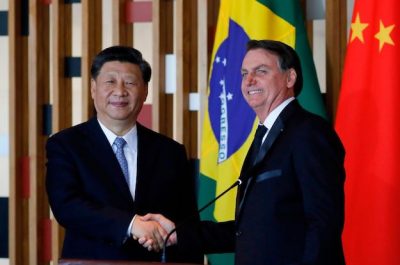Brazil’s Squabble with China Brings Unexpected Results Which Annoy US

The verbal attacks by members of the Brazilian government on China have been costly, not only to Brazil, but also to Jair Bolsonaro‘s biggest international ally, the United States. The offensive words to China recently spoken by Deputy Eduardo Bolsonaro, education minister Abraham Weintraub and foreign affairs minister Ernesto Araújo created a situation of gigantic diplomatic tension between Brazil and China. Beijing is well aware of how to manipulate this tension in its favor. As China is Brazil’s biggest trade partner, the Asian country is demanding certain benefits in its negotiations, which are quickly being granted.
Cornered and pressured in the face of the irresponsibility of his son and other members of his government, Jair Bolsonaro recently contacted Chinese President Xi Jinping apologizing for what had happened and trying to return to closer ties between the both countries. Xi, in all his political expertise, was not proud and welcomed Bolsonaro’s lamentations, but apparently demanded certain concessions. Just three days after telephone contact between the heads of State, Brazilian Vice President Hamilton Mourão announced that Huawei, a Chinese multinational in the technology and telecommunications industry, will be able to participate in the 5G technology infrastructure in Brazil.
The announcement of Huawei’s participation is the result of a true lesson of international relations expertise by the Chinese president. During the controversy involving the Brazilian government and its offenses against Beijing, several media agencies gave enormous coverage to the case, overestimating an alleged threat to the supply of masks and sanitary equipment to combat the pandemic of the new coronavirus in Brazil. The attention of Brazilians was focused on monitoring whether China would retaliate against Brazil by abandoning it to its own fate in the fight against the infection. In fact, this shows how far political analysts, the media and Brazilian public opinion in general are lagging behind in knowing how to do business on the international arena.
China has absolutely nothing to gain by blocking the supply of medical and sanitary equipment to Brazil or any other country. This international cooperation campaign is one of the great tools of Chinese foreign policy today. These acts of humanitarian diplomacy allow Beijing to strengthen relations with several countries, undermining influences from other powers and raising its international image. Still, the Chinese government is fully aware that in bilateral relations between Brazil and China, Brazilians are the most fragile part, with various sectors of the Brazilian economy dependent on the Chinese market, such as agribusiness. It is obvious that China would use this whole scenario as a backdrop to try to improve some specific points in the relations with Brazil instead of simply making silly decisions such as imposing international sanctions, cutting mask supplies or banning the purchase of Brazilian soy.
Unlike Bolsonaro, Xi Jinping demonstrates great skill and decorum in his relations with other statesmen. The Brazilian president’s apology was a beautiful opportunity to gently “suggest” the Chinese company’s insertion on the big 5G technology auction in Brazil. Interestingly, the biggest loser in this agreement was precisely the nation that Brazil currently supports and swears loyalty – the US. As it is well known, the great international dispute over control of 5G technology is between Washington and Beijing. Until then, the Brazilian government kept China out of the infrastructure projects in 5G platforms in the country, precisely because of its total alignment with the US, which is a central feature of Bolsonaro’s foreign policy. Now, this small “exchange of favors” between Brazil and China calls into question all the cooperation between Brasília and Washington in recent years. Attacking China, Brazil has hit the United States, its biggest international “ally”, and will now be even more vulnerable to the overwhelming advance of Chinese interests.
Gradually, over the past few decades, China has undeniably made its technological production a strong soft power mechanism. However, some geopolitical opponents of China have gone far beyond the concrete data in their speculations about China’s technological strategy. It was Donald Trump’s unfounded conspiracies about an alleged use of Huawei’s 5G technology for espionage purposes that served as the basis for international pressure to abolish Chinese participation on the 5G structure in all Washington allied countries – like Bolsonaro’s Brazil considers itself.
It was precisely this conspiracy speech that the Brazilian government maintained to keep China away from the 5G network in Brazil, but that all changed with Bolsonaro’s call to apologize for his son’s words. Now, what will become of the speech on Chinese espionage through Huawei? And what Bolsonaro will answer to Donald Trump? More importantly, what will be the Trump’s reaction to Bolsonaro’s betrayal? Considering the great strategic value of 5G technology, it is still possible that Brazil will lose its total alignment with the USA forever and be forced to further strengthen ties with China.
*
Note to readers: please click the share buttons above or below. Forward this article to your email lists. Crosspost on your blog site, internet forums. etc.
This article was originally published on InfoBrics.
Lucas Leiroz is a research fellow in international law at the Federal University of Rio de Janeiro.
Featured image: Chinese President Xi Jinping (L) and Brazilian President Jair Bolsonaro shake hands during a press statement after their bilateral meeting at Itamaraty Palace in Brasilia, Brazil, on November 13, 2019. (Photo by Sergio LIMA / AFP) (Photo by SERGIO LIMA/AFP via Getty Images)

